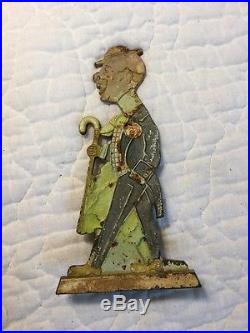
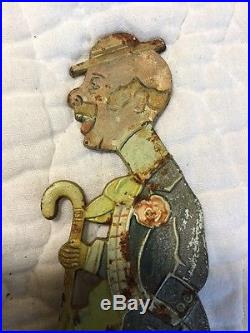
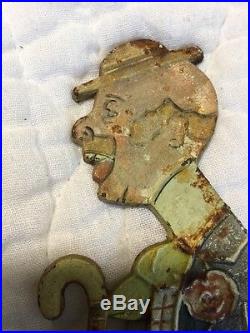
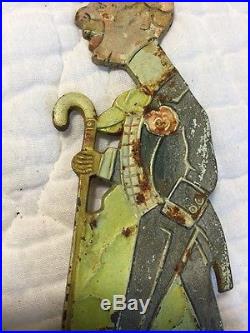
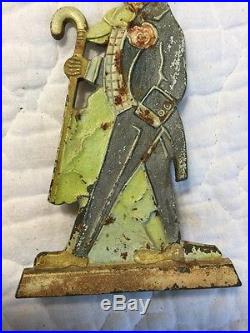
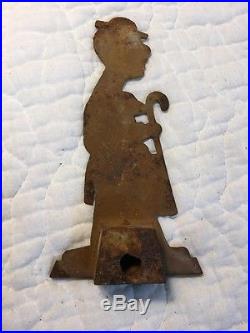
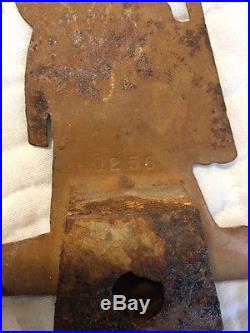
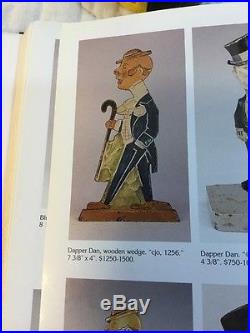
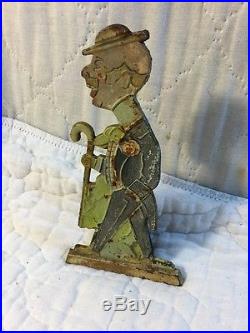

Rare Antique Art Deco Cast Iron HL Judd Doorstop Dapper Dan Man with Cane Old Original Paint. Measures 7 1/4 tall. Wedge type doorstop no longer has the wood insert but cast iron is complete with no cracks or chips and nothing repainted. It is Judd number 1256 and is correctly numbered on the back. One of the most desirable Art Deco era doorstops with great character. The same doorstop can be found on page 208 of The Doorstop Encyclopedia by Smith as shown in our last photo – it is a shot of the original 1939 Hubley catalog. Guaranteed a genuine older vintage original with old paint. In New Britain, Connecticut. The firm changed hands among family members and company names for a hundred years as it evolved into the J. In 1864, Albert, Edward and Hubert Judd moved the company to New Haven, Connecticut, then to its permanent location in Wallingford, Connecticut. A few years later, Hubert Judd struck out on his own to start the H. Judd Company in Brooklyn, NY. Judd took control of the Wallingford plant. In the early 1910s, they began to produce a decorative art metal line of fine-quality sand castings in iron, brass and bronze. Among these items were bookends and book racks, which were produced between 1910 and the late 1930s. Judd identified their bookends with a 9000 series stock numberand their doorstops with a 1000 series number. The prefix 0 was used in front of the 9000 series number on iron castings only when the same design was cast in both bronze and iron. Perhaps the only thing more welcoming than an open door is a brightly colored cast-iron doorstop holding it ajar. Like the best collectibles, these seemingly indestructible household objects are as visually appealing as they are practical, adding a bit of charm and whimsy to any home. Doorstops first appeared in England in the late 1700s. Made of cast brass, they were used to help prop open the heavy English doors, allowing air to better circulate through homes. The earliest doorstops had wooden handles so they could be easily moved. Handles disappeared in the 19th century; by then, cast iron had replaced brass. Most doorstops youll find today were likely made in America sometime between the turn of the last century and 1940. They hit their peak of popularity during the 1920s and 30s. It is hard to determine the age of a doorstop simply by its design, as some of the most popular styles were manufactured for decades. Motifs were numerous: rose-covered cottages, ships, lighthouses, windmills, covered wagons, trains, baskets of flowers or fruit, ladies in fine dress, children, gnomes, holiday and fairy-tale figures, cats, dogs, cartoon characters, and more. Nearly all examples featured brightly colored enamel paint. Manufacturers included Hubley in Lancaster, Pennsylvania; Bradley & Hubbard in Meriden, Connecticut; Wilton Products Inc. In Wrightsville, Pennsylvania; Albany Foundry in Albany, New York; and A. Greenblatt Studios in Boston. Most makers ceased production with the onset of World War II, but not all: John Wright Co. In Wrightsville, Pennsylvania, now reproduces some of the original Hubley patterns. Though age is not the determining factor in assessing the value of a doorstop, a reproduction of an earlier pattern is worth a fraction of the price of the original. Condition, paint surface, and rarity of the design are very important to collectors. Rust and repainting can drastically affect values. The best advice for determining whether a doorstop is truly vintage, not reproduction, is to examine the surface closely. Does the wear look inconsistent with use? Is the paint too shiny? Run your hand over it a real vintage doorstop will feel smooth, whereas a reproduction will have a rough, sandy surface. Also, seams on reproductions are often mismatched, and pieces are sometimes painted on the back side. Original manufactures never were. The item “Rare Antique Art Deco Cast Iron HL Judd Doorstop Dapper Dan Man w Cane Old Paint” is in sale since Sunday, March 27, 2016. This item is in the category “Antiques\Decorative Arts\Metalware”. The seller is “spooknook” and is located in Weymouth, Massachusetts. This item can be shipped worldwide.
- Type: Doorstops
- Primary Material: Cast Iron
- Style: Art Deco
